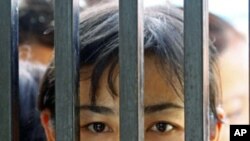Rights groups say they have new details about how Burma’s military forces prisoners to work as laborers and human shields on the front lines of its battles against ethnic militias.
Human Rights Watch and the Karen Human Rights Group say Burma’s military is forcing hundreds of convicts to work as porters, mine sweepers and human shields as it battles ethnic militias.
In a joint report released Wednesday in Bangkok, the rights groups detailed the abuses through interviews with 58 escaped prisoners.
The convicts say they were used in military operations from 2010 to 2011 against ethnic militias in eastern Burma’s Karen state and Pegu (Bago) region.
All say they were forced to work without pay and described slave-like conditions including inadequate medical care, food and shelter, as well as beatings, torture, and summary executions.
David Mathieson, a Burma researcher with Human Rights Watch, told the Foreign Correspondents Club of Thailand that the abuse of prison labor is systematic and widespread.
“This is not just something that happens in Karen state and a local rogue commander decides to be brutal. This was something that someone senior in the military instructed the Ministry of Home Affairs to assemble numbers of men from different facilities and then transport them through the country. And, it’s quite chilling how well organized it is,” Mathieson said.
The Karen Human Rights Group has documented the use of convict porters in Burma since 1992 but authorities have denied prisoners are exposed to fighting.
Rights groups say the mistreatment of convict porters on the front lines is one of many ongoing war crimes in Burma and the United Nations should be investigating through a commission of inquiry.
Human Rights Watch cites attacks on civilians, extrajudicial killings, forced relocations, torture, rape, and the use of child soldiers.
The New York-based group says Burma’s armed ethnic groups are also committing abuses including forced labor, indiscriminate use of land mines, and child soldiers.
Elaine Pearson is deputy Asia director for the group. She says there were hopes that Burma’s election last year would lead to a gradual improvement in human rights. “But, since the elections, the fighting has actually intensified in northern ethnic areas. And, there really hasn’t been any change in the army’s brutal behavior against civilians,” she stated.
Since gaining independence from Britain in 1948, Burma has fought sporadic battles against ethnic militias seeking autonomy.
The internal conflict is one of the world’s longest running and is a major reason authorities cite for decades of military rule.
Burma in November held its first election in 20 years, replacing a military government with a nominally civilian one led by former military leaders.
The election was widely condemned as a sham designed to keep the military in power.
Rights Groups Say Burma Army Using Prison Labor on Front Lines




